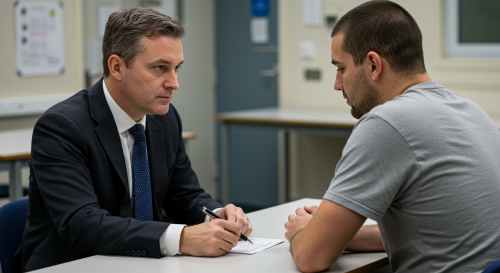What Are the Conditions Like in Police Detention?

What Are the Conditions Like in Police Detention?
Police detention is a critical phase in the criminal justice process in England. When individuals are taken into police custody, they may have concerns about their rights, the conditions of their detention, and the treatment they will receive.
This article aims to shed light on the conditions in police detention in England, the rights of detainees, and the procedures that govern this aspect of the legal system.
Detention Facilities

In England, police detention facilities are designed to provide a safe and secure environment for individuals held in custody. These facilities are usually located within police stations and are subject to strict regulations to ensure the well-being of detainees.
Rights of Detainees
Detainees in police custody in England have certain fundamental rights, including:
- Right to Legal Representation: Detainees have the right to consult with a solicitor. Legal advice can help them understand their situation, exercise their rights, and navigate the legal process effectively.
- Right to Remain Silent: Detainees have the right to remain silent and not answer questions during police interviews. They can choose to exercise this right until they have consulted with their solicitor.
- Right to Notify Someone: Detainees have the right to inform someone of their detention. This may include a family member, friend, or employer, although there are exceptions for certain serious offences.
- Right to Medical Attention: If detainees have medical needs, they should receive appropriate attention and medication while in custody. Medical professionals may be called upon if necessary.
- Right to Regular Welfare Checks: Police must conduct regular welfare checks to ensure the well-being of detainees.
Conditions of Detention

The conditions in police detention facilities are designed to meet certain standards to ensure detainees are treated humanely. These conditions typically include:
- Cleanliness and Hygiene: Detention cells should be clean and equipped with basic hygiene facilities, including toilets and handwashing facilities.
- Adequate Ventilation and Heating: Cells should have proper ventilation and heating to ensure a comfortable environment.
- Food and Water: Detainees should be provided with suitable food and clean drinking water. Special dietary requirements should be accommodated.
- Privacy and Rest: Detainees are entitled to rest and sleep. Cells should provide a level of privacy and a bed or sleeping surface.
- Visits: Detainees can have visits from their solicitor, a representative from the Independent Custody Visiting Scheme (ICVS), and sometimes family members or friends, depending on circumstances.
Procedures and Safeguards
Procedures governing detention in England include:
- Detention Record: A record is kept of the detainee’s personal details, the reasons for detention, and the time of arrival.
- Review of Detention: Detention must be regularly reviewed to determine its necessity.
- Recording Interviews: Police interviews with detainees are recorded to ensure transparency and accountability.
- Search Procedures: Detainees may be searched for their safety and the safety of others, and a record of the search is maintained.
- Complaints and Monitoring: Detainees can raise complaints about their treatment, and custody facilities are subject to monitoring by ICVS.
Conclusion: Understanding What the Conditions Are Like in Police Detention

Conditions in police detention in England are governed by laws and regulations aimed at ensuring the rights, well-being, and safety of detainees. Understanding these rights and procedures is essential for detainees and their legal representatives to navigate the legal process effectively and ensure that detention conditions meet appropriate standards.
Legal representation, the right to remain silent, and access to legal advice are crucial aspects of detainees’ rights during their time in custody.
Notice: Informational Content Disclaimer
The content provided on this website, including articles, blog posts, and other informational materials, is intended for general informational purposes only. It is not intended as, and should not be considered, legal advice.
Visitors to this website should be aware that the information presented here is not a substitute for seeking legal advice from a qualified solicitor or legal professional. Each individual's legal situation is unique, and the information provided may not be applicable to specific circumstances.
If you require legal advice or have specific legal questions, we encourage you to contact us directly. Our experienced team of solicitors is here to assist you with your legal needs and provide tailored advice to address your concerns.
Please be advised that any communication through this website, including the use of contact forms or email, does not create a solicitor-client relationship. Confidential or time-sensitive information should not be sent through this website. To establish a solicitor-client relationship and discuss your legal matters in detail, please contact us for a consultation.
We strive to provide accurate and up-to-date information, but we make no representations or warranties regarding the accuracy, completeness, or suitability of the information contained on this website. We shall not be liable for any reliance placed on the information provided herein.
Thank you for visiting our website. We look forward to the opportunity to assist you with your legal needs.




